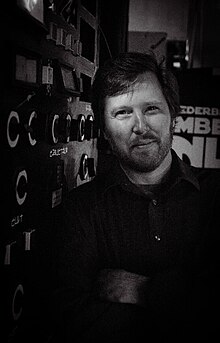Sascha Meinrath is an American policy activist and educator. He is currently the Palmer Chair in Telecommunications at Penn State University.
Sascha Meinrath | |
|---|---|
 | |
| Born | |
| Education | Yale University University of Illinois at Urbana-Champaign |
| Occupation(s) | Director, X-Lab & Palmer Chair in Telecommunications, Penn State University |
| Employer | Penn State University |
Meinrath founded the Open Technology Institute[1] in 2008 and directed the Institute while also serving as Vice President of the New America Foundation.
Meinrath has founded a number of other organizations, among them X-Lab (a technology think tank), the CUWiN Foundation, and the Open Source Wireless Coalition. He is also known for his work in opposition to the Stop Online Piracy Act and the PROTECT IP Act (SOPA and PIPA).[2]
Background edit
Sascha Meinrath was born in New Haven, Connecticut. He received his Bachelor of Arts in Psychology from Yale University in 1997, and a Masters of Arts in Social-Ecological Psychology from the University of Illinois at Urbana-Champaign. He is the son of a Brazilian immigrant to the U.S., and holds Brazilian, German, and U.S. citizenship.[3]
Career edit
In 2004 Meinrath worked as a policy analyst for Free Press, a national media reform organization. In 2007 he moved to Washington, D.C., to become the Research Director of the Wireless Futures Program at the New America Foundation. He launched the Open Technology Institute at New America Foundation in 2008, and became a Vice-President at New America and a co-founder of the Future of War Initiative.[4] He is a professor at Pennsylvania State University.[5]
Meinrath launched the Open Technology Institute at the New America Foundation in 2008.[6][2]
As of 2020, Meinrath serves on the board of Defending Rights & Dissent,[7] the American Indian Policy Institute,[8] Metamesh Wireless Communities,[9] Brave New Software Foundation,[10] and the Acorn Active Media Foundation.[11]
Commotion Wireless edit
Commotion is an open source “device-as-infrastructure” communication platform that integrates users’ existing cell phones, Wi-Fi enabled computers, and other wireless-capable devices to create community- and metro-scale, peer-to-peer communications networks.[12][13] Commotion was deployed with Occupy DC as well in the aftermath of Hurricane Sandy.[14][15]
Opposition to SOPA and PIPA edit
Meinrath opposed the Stop Online Piracy Act (SOPA) and the Protect IP Act (PIPA).[16]
International Summit for Community Wireless Networks edit
Meinrath hosts the regular International Summit for Community Wireless Networks (IS4CWN), a convening of leaders in community networks, mesh networking, and next-generation wireless technologies. The first summit was held in Urbana-Champaign, Illinois in 2004 launching the community wireless movement.[17] Past locations have also included St. Charles, Missouri, Washington, DC, and Vienna, Austria.[18] The eighth and most recent IS4CWN was held in October, 2013 in Berlin, Germany.
Publications edit
- 2013: Sascha D. Meinrath, James Losy and Benjamin Lennett. Internet Freedom, Nuanced Digital Dividess, and the Internet Craftsman. Afterward. The Digital Divide: The internet and social inequality in international perspective. Eds. Massimo Ragnedda and Glenn W. Muscher. London and New York: Routeledge.
- 2011: Sascha D. Meinrath, James Losey, and Victor Pickard. Digital Feudalism: Enclosures and Erasures from Digital Rights Management to the Digital Divide. The CommLaw Conspectus: Journal of Communications Law and Policy. Volume 19, Issue 2 (2011).
- 2010. Sascha D. Meinrath and Victor Pickard. The Rise of the Intranet Era: Politics and Media in an Age of Communications (R)evolution. Chapter for Kevin Howley (Ed.), Globalization and Communicative Democracy: Community Media in the 21st Century, London: Sage Publications.
- 2007. Sascha D. Meinrath and Victor Pickard. The New Network Neutrality: Criteria for Internet Freedom. Accepted for Publication: International Journal of Communications Law and Policy.
- 2007. S. Bradner, k.c. claffy, and Sascha D. Meinrath. The (un)Economic Internet. IEEE Internet Computing. Vol. 11(3). Pages 53–58.
- 2007 Sascha D. Meinrath and k.c. claffy. COMMONS Strategy Workshop Final Report: Cooperative Measurement and Modeling of Open Networked Systems.
- 2006: Sascha Meinrath and Ben Scott. Community Internet: Why Should Arts and Culture Funders Care. Grantmakers in the Arts Reader.
- 2003: Ben Scott and Sascha Meinrath. Media Reform Explodes onto American Political Scene. Public i. Vol. 3(10).
References edit
- ^ "Sascha Meinrath". New America Foundation.
- ^ a b "Digital Power Index". Newsweek. June 24, 2012. Retrieved 1 July 2012.
- ^ "Sascha Meinrath". Penn State University. Retrieved 27 July 2022.
- ^ "Sascha Meinrath Named Research Director of New America Foundation's Wireless Future Program," New America Foundation (August 15, 2007)
- ^ Fidlin, Dave (2019-06-03). "Study looks at scope of Pennsylvania's broadband access challenges". The Center Square. Retrieved 2019-11-01.
- ^ "New America Foundation Launches Open Technology Institute". New America Foundation. Retrieved 21 January 2013.
- ^ "Board of Directors". Retrieved 1 May 2020.
- ^ "Board of Directors". Retrieved 27 July 2022.
- ^ "Board of Directors". Retrieved 27 July 2022.
- ^ "Propublica Tax-Exempt Organizations". Retrieved 27 July 2022.
- ^ "Our Staff". Retrieved 27 July 2022.
- ^ "Commotion Wireless". Retrieved 2 July 2012.
- ^ James Glanz and John Markoff (June 12, 2011). "U.S. Underwrites Internet Detour Around Censors". The New York Times. Retrieved August 8, 2011.
- ^ Singel, Ryan (15 December 2011). "U.S.-Funded Internet Liberation Project Finds Perfect Test Site: Occupy D.C." Wired. Retrieved 21 January 2013.
- ^ Zandt, Deanna (10 November 2012). "What Sandy Has Taught Us About Technology, Relief and Resilience". Forbes. Retrieved 21 January 2013.
- ^ James Losey & Sascha Meinrath (December 8, 2011). "The Internet's Intolerable Acts". Slate Magazine. Retrieved December 11, 2011.
- ^ "POSTCARDS FROM THE BLEEDING EDGE". Retrieved 21 January 2013.
- ^ "National Summit for Community Wireless Networks to Explore the Future of Internet Access". Retrieved 21 January 2013.